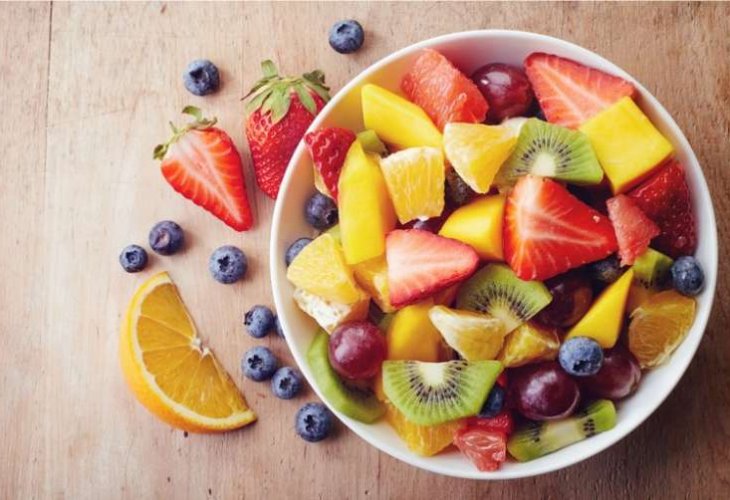Health and Mind
The Sweet Wisdom of Fruit: Hashem’s Perfect Food for Us
How fruits nourish body and soul, with insights from Jewish tradition and natural health wisdom

Fruits are one of Hashem’s most perfect gifts to us. They’re filled with natural sugars sucha as glucose (grape sugar) and fructose (fruit sugar) which are absorbed quickly into the bloodstream, giving us energy and vitality.
Unlike grains or starches, fruits contain no starch. Some fruits begin with organic acids that slowly turn into sugars as the fruit ripens. They contain only a small amount of protein, and they take very little energy to digest, usually only 30 to 60 minutes. This makes them a wonderful source of quick, clean energy.
Some fruits continue to ripen after they’re picked like apples, bananas, mangoes, avocados, pears, and peaches. Others must fully ripen on the tree or plant before being harvested, such as watermelon, figs, pomegranates, and loquats.
Fruits create an alkaline effect in the body, which is helpful in preventing disease and maintaining health. They are packed with dietary fiber, plant nutrients (called phytochemicals), and vitamins, all essential for good health.
Most fruits are made up of 80–90% water. That means they hydrate the body while also helping to gently detoxify it.
What Is a Fruit?
Botanically speaking, a fruit is the part of the plant that contains seeds. This includes common fruits like apples and grapes, but also foods like cucumbers and tomatoes, which many people think of as vegetables. The soft, sweet part of the fruit that surrounds the seeds is usually what we enjoy eating. Some seeds, like those in watermelon or melons, can be eaten, while others (like apple or apricot seeds) may contain substances that are toxic in large amounts.
In almost every way, fruit is considered the ideal food for humans. It contains nearly everything we need like good taste, easy digestion, vitamins, natural sugar, and even some protein. It’s gentle on the body and even works as a healing food when someone is sick. For babies, fruits alongside mother’s milk are the best first foods.
Another special benefit of fruit is that it doesn’t need to be cooked or seasoned. It comes directly from Hashem, ready to eat and full of life.
Ripe or Not Ripe?
It’s important to eat fruits only when they’re fully ripe. Hashem created them to be consumed in their natural, ripe state. Fruits that are picked too early and ripened artificially may not be as beneficial and can even upset the body.
Some fruits like mangoes and avocados are often eaten before they’re fully ripe, which may be harder for the body to digest. Once ripe, fruits can be kept in the refrigerator but should be eaten soon, if they get overripe, they may begin to spoil or ferment.
When Should We Eat Fruits?
The Rambam (Maimonides), one of the greatest Torah scholars and physicians, shared timeless wisdom about when and how to eat fruit. He taught that fruits which loosen the stomach like grapes, figs, berries, and watermelon, should be eaten before a meal, on an empty stomach. These should not be mixed with heavy foods. Other fruits, like apples and pomegranates, help firm the digestive system and should be eaten after meals, but in moderation.
The Rambam also advised not to overeat even healthy fruits and warned against unripe or sour fruits, except in small amounts during summer. However, figs, grapes, and almonds are always good for the body, whether fresh or dried.
Whole Fruits vs. Juice
Whenever possible, eat whole fruits instead of drinking juice. Hashem designed fruits to be chewed, not juiced. When we juice them, we lose valuable fiber and even some vitamins like vitamin C, which can break down when exposed to air, heat, or metal.
Types of Fruits
Here’s a helpful guide for understanding different kinds of fruit and how to combine them:
Sweet Fruits – raisins, figs, bananas, moist dates, melons, sweet grapes, persimmons
Tart Fruits – apples, loquats, mangos, guavas, papayas, cherries, passion fruit
Sour Fruits – oranges, grapefruits, lemons, strawberries, pomegranates
Sweet vegetables (like carrots or beets) can be eaten with any fruit. Sour fruits go well with nuts.
How Long Does It Take to Digest?
Fresh fruits: 30 to 60 minutes
Fruit juice: around 30 minutes
What About Nuts and Seeds?
Many people worry that nuts are too fattening. But in moderation, nuts can actually help with weight loss and lowering bad cholesterol (LDL) while raising the good kind (HDL). They also help nourish the immune system, support reproductive health, and strengthen skin, hair, and bones.
Nuts and almonds are technically considered fruits. They are very dense in protein and healthy fats and are best eaten in small amounts.
Important Guidelines for Eating Nuts:
Avoid salted or roasted nuts except cashews, pistachios, and peanuts, which must be roasted to remove natural toxins. (Note: Peanuts are actually legumes, not true nuts.)
It’s best to buy nuts in their shells. If that’s not possible, buy from a store with high turnover to ensure freshness.
Store them in a glass jar in the freezer to keep them fresh longer.
Try to eat 2–3 types of nuts daily, in modest amounts.

